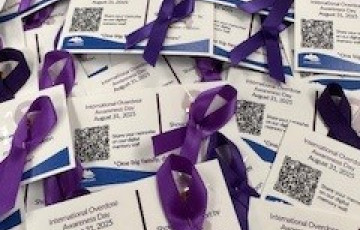Collaboration and partnership can transform the health of individuals and communities. To expand collaborative opportunities, for the third year Island Health is allocating up to $450,000 for Youth Resilience Grants (previously known as Resilience and Safety Grants), in an inaugural partnership with Pacific Public Health Foundation. These grants aim to help improve mental well-being and build youth resilience to challenging life events.
Eligible organizations include not-for-profit organizations, schools and Indigenous-led organizations for with initiatives that support youth health and wellness.
Resilience grants of up to $50,000 are available to launch new and innovative projects/programs in communities across the Island Health region. The Youth Resilience Grants are not intended to fund ongoing or existing programs.
Read about the latest Youth Resilience Grants news.
Disconnection and isolation from community and culture, eco-anxiety due to climate change and the unregulated drug poisoning emergency have all contributed to increasing rates of poor mental health among youth. Many would benefit from supports to develop resilience in a changing world.
Applications should focus on promoting protective factors, specifically:
- Connections to one or more stable and supportive adults
- Belonging to a broadly defined family, community or school
- Connection to culture
- Sense of autonomy, competence, purpose
- Social and emotional learning and skills
Youth resilience Grants provide the opportunity for schools, school districts, Parent Advisory Councils, youth-led groups, not-for-profit organizations, local government organizations, Indigenous-led organizations and communities to apply for one-time funding to improve resilience among youth up to age 19.
Proposed initiatives should clearly describe how they promote activities among youth that foster at least one of the following protective factors:
Connections to one or more stable or supportive adults:
Initiatives focused on developing and supporting stable relationships between youth and caring adults could include, but are not limited to:
- Skill-building for parents, caregivers, mentors, coaches
- Cultural activities that promote connection between Elders and youth
- Youth mentorship programs
Belonging to a family, community or school:
A sense of belonging to family, community (broadly defined) or school increases resilience by providing the acceptance and identity necessary for healthy development. A sense of belonging can also provide a critical social support network to help children and youth manage stressful situations. Initiatives that increase belonging among youth could include, but are not limited to those that:
- Facilitate youth-led advocacy and/or mental health promotion initiatives (e.g., climate change or anti-racism projects)
- Facilitate participation in sports teams, drama productions, music, bands and involvement with youth groups or other programs that foster caring and supportive friendships
- Social improvements in a school community to enhance connectedness, belonging and/or safety
Connection to culture:
Values, practices and beliefs learned though culture can help children and youth overcome challenging situations. Connection to culture can also contribute to a sense of personal identity and belonging, and provide social connection to others who may be able to provide support in times of adversity. Initiatives aimed at improving youth connection to culture may include, but are not limited to:
- Fine arts, language, traditional food acquisition and preparation
- Intergenerational activities
- Faith-based and spiritual activities
- Activities that increase connection to land and water
Autonomy, competence and purpose:
Autonomy, competence and purpose refers to children and youth increasing their ability to think and make decisions, display self-compassion and take meaningful action on their goals. Activities to increase children and youth’s sense of autonomy, competence and purpose could include, but are not limited to:
- Skills training — such as first-aid or trades-related training — that improves employability
- Supports to assist in overcoming academic barriers
- Tangible and emotional support to enhance opportunities for youth to pursue a chosen passion
- Programs aimed at the development of self-compassion and mental health promotion
- Youth volunteer opportunities
Social and emotional learning and skills:
Developing emotional intelligence allows children and youth to manage their emotions and reduce consequences of not addressing their feelings. Initiatives aimed to increase children and youth’s social and emotional competence include, but are not limited to:
- Group sessions that teach social and emotional learning (i.e., self-regulatory, growth mindset and problem-solving skills) or other life skills for youth, as well as for educators or parents/caregivers
- Peer mentorship campaigns or youth-led committees that promote safety, inclusivity and respect of diverse student groups
Selection Criteria
Proposals that incorporate the following principles or components are encouraged:
- Youth-led initiatives
- Equity, diversity and inclusion (e.g., inclusive learning environments, cultural sensitivity, anti-racism, social justice)
- Rural and remote communities within Island Health
- Indigenous wellness or ways of knowing and being
- Health practices (e.g., sleep hygiene, access to nature, physical activity, skill-building, access to culture, healthy eating, etc.)
- Holistic health and/or mental health promotion
- Harm reduction (e.g., safer sex supplies, peer education, social pressures, time away from technology, etc.)
- Demonstrated school partnerships
- Demonstrated community partnerships
Out of scope
- Ongoing initiatives that already exist within the Island Health community
- Ongoing initiatives that already exist with a current Island Health partner
- New or ongoing initiatives that are not within Island Health’s geographic area
- New or ongoing initiatives that do not directly include the target population, which is youth up to age 19
- Capital or administrative expenses greater than 10 per cent of the entire grant amount
Inspiration
The following are examples of how citizens and businesses have led the way to destigmatize and create safety for people who use substances:
Resilience and Safety Grant Recipients 2024
- North Island
-
- Kwikwasut'inuxw Haxwa'mis First Nation – Cultural Connections and Belonging
- North Island College – Building Healthy Trades
- North Island Crisis and Counselling Centre – New Beginnings Outreach
- Sasamans (Our Children) Society – Indigenous Youth and Elder Resiliency Group
- Central Island
-
- Alberni Valley Community School Society - čaamapiʔin: Indigenous Leadership & Transition Program
- AVI Health & Community Services – RYHME (Resilience and Harm Reduction)
- Cedar Community Secondary School - Uy'shqwaluwan
- Clements Centre for Families – Workplace Resilience for Supported Independent Living Program
- Cowichan Tribes – Tutleen’utul for Safety
- Literacy Central Vancouver Island – Trade Skills Literacy Connect
- Narwell Services Society – Wellness Tools in Trades: Health Promotion Resiliency Program
- Nourish Cowichan – Nourish Cowichan Food Equity Ambassador: Building Youth Resiliency through Peer-to-Peer Supports
- Nuu-chah-nulth Youth Warrior Family Society – Diving for Resilience
- Pacific Rim School District - hišukʔiš c̓awaak: Everything is One
- Qualicum School District – Braveheart
- Town of Ladysmith – YOUth Bloom
- South Island
-
- Aboriginal Coalition to End Homelessness – Culture First
- Aunty Collective – Land Back for Aunties
- Salt Spring Community Health Society – Expanded Community Harm Reduction Peer Support Outreach &
- Volunteer Counselling Programs – Mental Wellness Initiative
- Tau Wellness Coop – Betwix’d Commonshore Theatre
- Victoria Women’s Transition House Society – Youth Engagement and Eco-Therapy Project
- Regional
-
- Good Night Out Vancouver, Victoria Office – Safer Partying Campaign (Wild Night Out)
Resilience and Safety Grant Recipients 2023
- North Island - Increasing Youth Resilience
-
- Nawalakw - Nawalakw Language Camps - hi'ma̱nis ḵ̓aḵ̓ut̓ła̱'at̓si
- Lake Park Society - Land Care-Self Care Outdoor Camp
- North Island - Improving Workplace Resilience and Individual Safety Related to the Toxic Drug Crisis
-
- Kyuquot Checleseht First Nation - Culture as Medicine: Building a Strong Workplace Culture
- The Salvation Army Mt Waddington Community Ministries - Workplace Resilience and Support Project
- North Island - Workplace Resilience and Support Project
-
- Comox Valley Art Gallery – Walk with Me - Strengthening Patient-Oriented Research Framework to Improve Services for People in the Trades Who Use Drugs: Story Walk featuring trades specific stories
- K’wak’walat’si Child and Family Services - Harm Reduction Station and Training
- Central Island - Increasing Youth Resilience
-
- School District 79 (Cowichan Valley) - Well-being and Resilience in Youth
- ADAPS Youth and Family Services - Youth Peer Support Training
- Vancouver Island University – Child and Youth Care Program - Coming Alongside Caregivers
- School District 70 – Ucluelet Secondary School - USS Wellness Initiative – Wellness Wednesdays
- Port Alberni Friendship Centre - Ready Set Grow
- School District 68 (Nanaimo-Ladysmith) – Nanaimo District Secondary School - Shxw’al’uq’wa’
- Red Girl Rising Movement Society - Team 700+ Indigenous Youth Boxing Camp
- Cowichan Valley Intercultural and Immigrant Aid Society - Leadership and Employment Preparation for Newcomer Youth
- Central Island - Improving Workplace Resilience and Individual Safety Related to the Toxic Drug Crisis
-
- Vancouver Island Regional Library - Brave Branches
- Cowichan Brain Injury Society - Men’s Shed
- Stephanie McCune Counselling and Consulting - In My Chair
- South Island - Increasing Youth Resilience
-
- BGC South Vancouver Island - Upstream Project
- Stqeeye’ Learning Society - Youth on the Land
- Galiano Health Care Society - Surviving to Thriving: An Initiative for Island Youth
- University of Victoria – Living Lab Project - Relational Restoration and Land-Based Healing: The Living Lab Indigenous Youth Wellness and Stewardship Project
- Greater Victoria Volunteer Society (Volunteer Victoria) - Eco-Anxious Stories and Action Steps
- University of Victoria – School of Public Health and Social Policy - Bringing the čupuc to Life
- School District 62 (Sooke) - In This Together: Peer Mentoring for Middle/Secondary School Youth
- West Shore Restorative Justice - Restorative Justice Coffee Talk
- South Island - Improving Workplace Resilience and Individual Safety Related to the Toxic Drug Crisis
-
- Umbrella Society for Addictions and Mental Health - Workplace Engagement: Lunch and Learn Harm Reduction and Substance Use Education Targeted to the Trades, Hospitality and Sales industries
- District of Oak Bay Parks and Recreation Services - You See Everything
- Regional - Improving Workplace Resilience and Individual Safety Related to the Toxic Drug Crisis
-
- Good Night Out Vancouver, Victoria Office - Safer Partying Campaign for the Hospitality Industry
- University of Victoria - Vancouver Island Drug Checking Project - Drug Checking: A New Tool in the Toolbox



